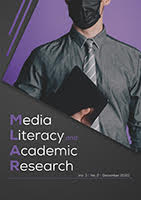University Students Engagement With And Disengagement From Fake News
University Students Engagement With And Disengagement From Fake News
Author(s): William Mel C PaglinawanSubject(s): Social Sciences, Education, Media studies, Communication studies, Theory of Communication
Published by: Univerzita sv. Cyrila a Metoda v Trnave, Fakulta masmediálnej komunikácie
Keywords: Fake news;Online media;Engagement and disengagement;Media studies
Summary/Abstract: The immensity of the exposed news online has given everybody the chance to manipulateinformation; and so, confusion and misinformation transpire, and the evaluation of credibilityand trustworthiness becomes intricate. In spite of the continuous efforts of various academicinstitutions to provide a wide array of databases and resources among learners – still thecurrent phenomenon called fake news has become incessantly dispersing. This research hasexplored university students’ dis/engagement from/to fake news. Using quantitative measures,it was revealed that the students had used online platforms for communication processes andfor retrieving and allocating information. Moreover, upon text mining the student responses,nearly all defined fake news as satirical with misleading and fabricated content which tends todeceive and do harm to people. Students also have a moderate view in which they scarcelybelieve that as they disengage from fake news, they will develop their communication skillssince they learn how to fact check information before sharing it. Lastly, the content analysishas revealed various themes divulging students’ experiences of fake news and its implicationsto the curriculum.The immensity of the exposed news online has given everybody the chance to manipulateinformation; and so, confusion and misinformation transpire, and the evaluation of credibilityand trustworthiness becomes intricate. In spite of the continuous efforts of various academicinstitutions to provide a wide array of databases and resources among learners – still thecurrent phenomenon called fake news has become incessantly dispersing. This research hasexplored university students’ dis/engagement from/to fake news. Using quantitative measures,it was revealed that the students had used online platforms for communication processes andfor retrieving and allocating information. Moreover, upon text mining the student responses,nearly all defined fake news as satirical with misleading and fabricated content which tends todeceive and do harm to people. Students also have a moderate view in which they scarcelybelieve that as they disengage from fake news, they will develop their communication skillssince they learn how to fact check information before sharing it. Lastly, the content analysishas revealed various themes divulging students’ experiences of fake news and its implicationsto the curriculum.
Journal: Media Literacy and Academic Research
- Issue Year: 3/2020
- Issue No: 2
- Page Range: 77-87
- Page Count: 11
- Language: English

